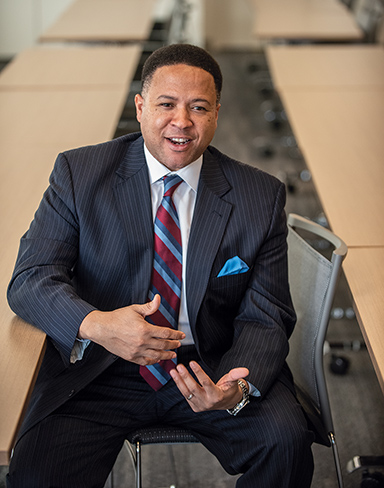Showing Up with an Equity Lens
A Conversation with Orlando Watkins, Part II
TBF News Fall 2018
Orlando Watkins returned to the Boston Foundation in June of 2016 as Vice President for Programs, after a stint with MATCH Education as Executive Vice President. Here, he speaks about the work he and his grant-making team are doing in the city. Part I of the interview, which focuses on his thoughts about race, equity and Boston, can be found in the Summer 2018 issue of TBF News.
Talk about some of the work you’re most excited about in the Boston Foundation’s different strategy areas.
I’m proud of so much that we are leading as a foundation and I’m especially proud of the Programs team that I get to work with every day to fight for social justice and equity.
One of the things we did in the first year of my tenure as V.P. of Programs was to engage in a six-month exercise to define our values and guiding principles. As a leader in this very privileged institution, it is important to me that I’m working with a team of people who believe we do this work in service with community and that showing up humbly and listening and working in partnership are all essential to the change we want to see.
Over those early months we developed, as a team, a set of action based principles that guide our work, our leadership and the allocation of our resources. Those principles include using a racial equity lens in our grant making and committing to value all lived experiences, with a focus on communities that have been historically left out or left behind.
The result is that much of our work has an explicit focus on race and equity and the true value of understanding and being guided by the communities we have been entrusted to serve. For example: Our Arts & Culture strategy launched Live Arts Boston, which has been intentional about extending access to resources and support to artists in communities of color. The result: More than 70 percent of the artists we support through LAB are people of color.
In our Grassroots strategy, we have built a Neighborhood Fellows program that works in partnership with exceptional community leaders to inform the Foundation’s approach to issues and help direct resources to the community.
In our Open Door Grants program, we have developed a review process that values the diversity of leadership in organizations and we track data about diversity across the applicant pool to better understand the diverse needs of the nonprofit community.
In our Nonprofit Effectiveness work, we have launched a Diversity, Equity and Inclusion initiative that is designed to support the broader nonprofit sector, which primarily has not been led by people of color—and to understand that transformative work needs to happen to promote diversity and inclusion in the sector.
In Jobs & Economic Development, we have partnered with Eastern Bank to launch the Business Equity Fund, which is investing capital into existing and established black and Latino businesses. We know these companies tend to employ people from the communities we focus on most, so this effort has the double impact of building wealth for entrepreneurs and increasing employment opportunities for communities of color. Both will contribute to narrowing the wealth gap that we hear so much about in Boston.
So, there are many areas where the Foundation is leading, explicitly, on issues of race and equity. I’m proud that this commitment is showing up in our work.
You often say that you’re interested in “showing up in a different way” for the community. What do you mean by that?
I personally believe that the deeper and more authentic the partnerships are with the communities and organizations we work with, the more sustainable impact we will have.
I also realize that there is a privilege and a power dynamic that exists between a billion-dollar foundation and the community it serves. To me that means we have to work harder to be intentional, to be truly aware of the needs of the individuals and families we serve. That intentionality is in part shaped by the people on my team. Do they represent the communities being served? Are they capable of holding these privileged seats while remaining humble listeners and servants? If so, we have a chance to show up in a way that values the lived experiences of people and ultimately achieve meaningful lasting change together.
Here is one of my favorite things we do as a department that is further shaping our ability to “show up”: We have replaced one of our bi-monthly meetings with something we call “Culture and Dialogue,” to create space to tackle tough challenges and conversations that are happening in our communities. Because of the diversity of our team, often the person leading the conversation is someone who has lived the experience we’re discussing. We’ve had sessions on immigration, gender identity, power and privilege and other topics. To me, that’s walking the walk. “Showing up” is about a willingness to understand our differences, have the tough conversations and, in the end, believe that there is more that binds us than separates us.

